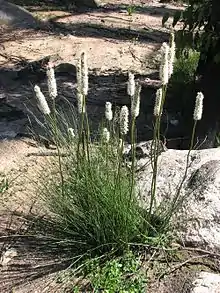Xanthorrhoea minor
Xanthorrhoea minor is a species of grasstree of the genus Xanthorrhoea native to south-eastern Australia. It was one of the many species authored by the Scottish botanist Robert Brown.[1]
| Xanthorrhoea minor | |
|---|---|
 | |
| Xanthorrhoea minor subsp.lutea at Bunyip State Park in Victoria | |
| Scientific classification | |
| Kingdom: | Plantae |
| Clade: | Tracheophytes |
| Clade: | Angiosperms |
| Clade: | Monocots |
| Order: | Asparagales |
| Family: | Asphodelaceae |
| Subfamily: | Xanthorrhoeoideae |
| Genus: | Xanthorrhoea |
| Species: | X. minor |
| Binomial name | |
| Xanthorrhoea minor | |
Unlike some other species of grasstree, it lacks a trunk, and its leaves grow from one or more underground stems. The leaves are green. It flowers from October to November.[2]
Two subspecies are currently recognised:
- X. minor subsp. lutea from South Australia and Victoria
- X. minor subsp. minor from New South Wales, which grows in wet poorly drained areas such as swamps around the Sydney Basin, north to Gosford, and west to Springwood and south to Campbelltown.[3][2]
References
- "Xanthorrhoea minor R.Br". Australian Plant Name Index (APNI), IBIS database. Centre for Plant Biodiversity Research, Australian Government.
- D.J.Bedford. "New South Wales Flora Online: Xanthorrhoea minor". Royal Botanic Gardens & Domain Trust, Sydney, Australia.
- "Xanthorrhoea minor". Australian Plant Name Index (APNI), IBIS database. Centre for Plant Biodiversity Research, Australian Government, Canberra. Retrieved 2010-06-22.
This article is issued from Wikipedia. The text is licensed under Creative Commons - Attribution - Sharealike. Additional terms may apply for the media files.